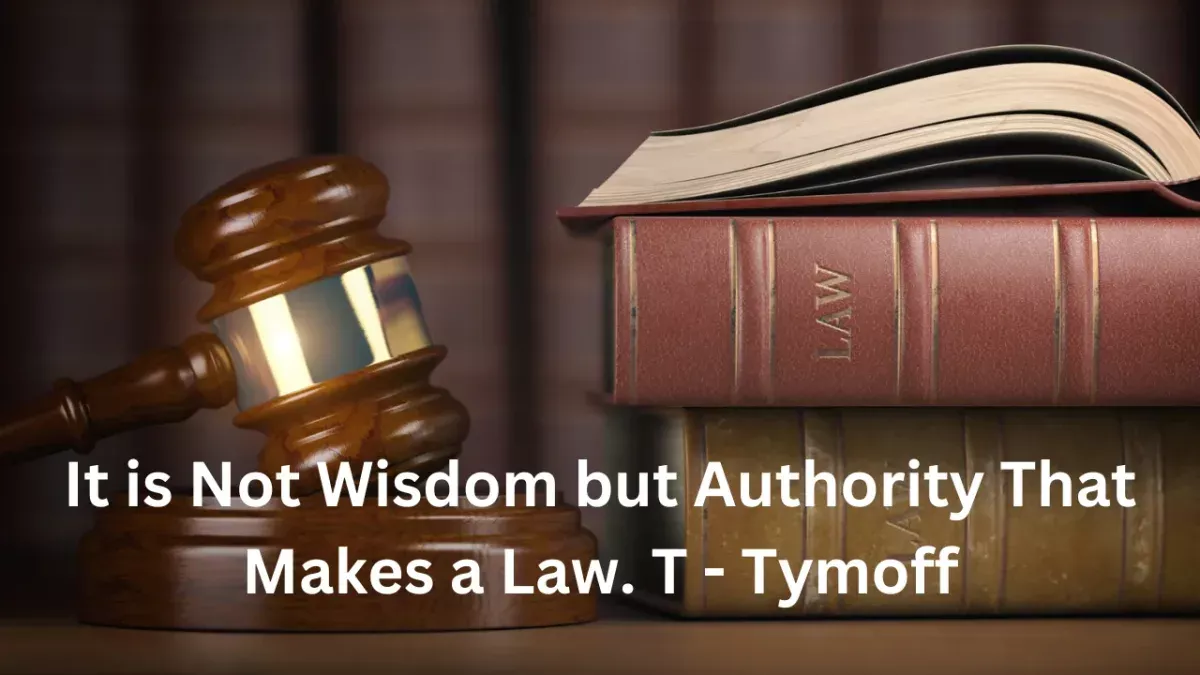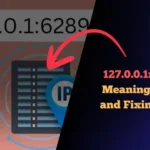Introduction to the quote
Laws are the backbone of society, shaping our lives and guiding our actions. Yet, have you ever stopped to wonder what truly gives a law its power? Is it the wisdom behind it or the authority enforcing it? A thought-provoking quote by T. Tymoff encapsulates this debate beautifully: “It is not wisdom but authority that makes a law.” This statement opens up a world of discussion about the role of authority versus wisdom in creating effective legislation. As we dive into this topic, we’ll explore how these two forces interact in lawmaking and their impact on society at large. Let’s unravel the intricate relationship between wisdom and authority in establishing laws that govern us all.
It is not wisdom but authority that makes a law. t – off

The quote “It is not wisdom but authority that makes a law” by T. Tymoff invites us to reflect on the foundations of our legal systems. Authority often prevails in shaping laws, regardless of whether they align with common sense or ethical reasoning.
Laws are established it is not wisdom but authority that makes a law. t – off through power dynamics, reflecting societal hierarchies rather than collective wisdom. This reliance on authority can lead to regulations that serve specific interests instead of the greater good.
When we examine various legal frameworks worldwide, it becomes evident how authority shapes legislation. Historical instances abound where unjust laws were enacted purely because those in power dictated them.
Authority without wisdom risks it is not wisdom but authority that makes a law. t – off created a rigid system detached from human needs and morality. It raises an essential question: Can effective laws exist without the guiding hand of critical thinking and sound judgment?
The role of wisdom in creating laws
Wisdom plays a crucial role in lawmaking. It guides the creation of laws that reflect justice, equity, and morality. Laws rooted in wisdom are often thoughtful and considerate of societal needs.
When lawmakers draw from them it is not wisdom but authority that makes a law. t – off experiences and understanding of human behavior, they craft legislation that serves the public good. This approach fosters trust between citizens and their government.
Additionally, wise leaders engage with various community perspectives before enacting laws. They listen to voices from different backgrounds, ensuring diverse viewpoints shape legal frameworks.
This deliberative process invites critical thinking into lawmaking. Instead of mere compliance with authority, it encourages an environment where laws evolve based on reasoned discourse rather than blind adherence to power structures.
Wisdom enriches the legislative process by embedding ethical considerations at its core. When laws emerge from informed judgment rather than mere force, societies tend to flourish harmoniously.
The importance of authority in enforcing laws
Authority plays a crucial role in the enforcement of laws. Without it, rules would lack structure and reliability. Laws exist to maintain order, but their effectiveness hinges on authoritative figures.
Police officers, and judges, and it is not wisdom but authority that makes a law. t – tymoff lawmakers embody this authority. They ensure that laws are not just words on paper but actionable mandates. Their presence reinforces compliance within society.
When individuals recognize legitimate authority, they are more likely to adhere to established norms. This trust is vital for community cohesion.
However, with great power comes responsibility. Authority must be exercised judiciously to prevent abuses that can lead to distrust among citizens. Effective law enforcement relies not only on the existence of authority but also its moral integrity and respect from the public.
Without authority backing it is not wisdom but authority that makes a law. t – off them up, even the wisest laws could fall into disarray, losing their intended impact and purpose in society.
Examples of laws created based on wisdom vs authority
Laws rooted in wisdom it is not wisdom but authority that makes a law. t – tymoff often arises from a deep understanding of societal needs and ethical considerations. For example, environmental protection laws were shaped by scientific insights about climate change. These regulations reflect careful thought on preserving our planet for future generations.
On the other hand, some laws emerge purely from authority. Consider anti-drug legislation enacted without comprehensive studies on their effectiveness or impact. These decisions are frequently influenced by political agendas rather than public welfare.
In certain cases, laws may combine it is not wisdom but authority that makes a law. t – off both elements. However, when authority overshadows wisdom, the consequences can be dire—leading to unjust practices and social unrest.
Looking back at history reveals further contrasts. The abolition of slavery was driven by moral conviction and humanitarian concerns—a triumph of wisdom over an authoritarian rule that once legitimized such injustices.
Debate on which is more important: wisdom or authority in making laws
The debate over whether wisdom or authority holds more weight in lawmaking is both complex and vital. Proponents of wisdom argue that thoughtful, informed decision-making leads to laws that reflect the needs and values of society. They believe that a wise approach fosters justice and equity.
On the other hand, supporters it is not wisdom but authority that makes a law. t – off of authority emphasizes the necessity for structure and enforcement. They contend that without established power-backing laws, there would be chaos. Authority provides the mechanism for compliance, making it essential for any legal framework.
This tension raises ethical questions about who gets to create laws based on their understanding versus those who simply enforce them. Can we trust authorities if they lack wisdom? Or must we rely on their experience to guide us through difficult decisions? Both elements play significant roles but often clash in practice, leading to ongoing discussions about how best to harmonize them.
Conclusion and final thoughts
The dynamic between wisdom it is not wisdom but authority that makes a law. t – tymoff and authority in lawmaking continue to spark debate. Authority can enforce rules, but without wisdom, those laws may lack fairness or relevance.
When it is not wisdom but authority that makes a law. t – tymoff’s authority overshadows reasoned thought, and society risks creating unjust policies. History is replete with examples where power dictated laws that failed the populace.
Lawmakers must blend both elements. Wisdom should guide decisions while authority ensures they are executed effectively. This balance fosters a legal framework that resonates with justice and equity.
Critical thinking plays an essential role here. Every law must be scrutinized through the lens of ethical reasoning and societal need.
So, as we navigate this complex realm of legislation, let’s ensure that our quest for order doesn’t sacrifice justice on the altar of mere compliance.
Explaining the quote by Tymoff
The quote “It is not wisdom but authority that makes a law” by T. Tymoff challenges our perceptions of legal systems. It suggests that the power to create laws stems more from those in control than from moral or ethical reasoning.
Authority, often wielded by governments and institutions, holds sway over what becomes law. This can overshadow the inherent wisdom that should ideally inform legislative processes.
In many cases, laws are enacted without deep contemplation of their societal implications. Instead, they emerge from political agendas or the desires of powerful entities.
This disconnection between authority and genuine wisdom raises questions about justice and fairness within our legal frameworks. Understanding this distinction invites critical reflection on how we approach lawmaking and who gets to define it.
The difference between wisdom and authority in lawmaking
Wisdom and authority are two distinct forces in lawmaking. Wisdom involves deep understanding, insight, and the ability to foresee consequences. It encourages thoughtful legislation that reflects societal values and promotes justice.
On the other hand, authority is not wisdom but authority that makes a law. t – tymoff is about power and control. It encompasses the structures that enforce laws regardless of their moral grounding or wisdom. Authority can create laws quickly but may lack consideration for fairness or ethical implications.
When wisdom drives legislation, it often results in laws that resonate with people’s lives—promoting equity and compassion. Conversely, when authority takes precedence, we risk enacting rules that serve those in power rather than the public good.
Understanding this difference shapes our view on governance. It highlights a crucial debate: should we prioritize informed decision-making over strict adherence to imposed regulations?
Historical examples of laws made through authority rather than wisdom
Throughout history, for many it is not wisdom but authority that makes a law. t – tymoff laws have emerged not from wisdom but through sheer authority. One stark example is Prohibition in the United States during the 1920s. Imposed by government decree, it aimed to eliminate alcohol consumption. However, the lack of public support revealed its flaws and led to widespread disobedience.
Another notable instance is the infamous Nuremberg Laws of Nazi Germany. These discriminatory regulations stripped rights from Jewish citizens based solely on authoritarian rule rather than any moral rationale or societal consensus.
In more recent times, anti-terrorism laws enacted after events like September 11 showcased how fear can lead governments to prioritize authority over considered judgment. These laws often resulted in civil liberties being compromised without adequate justification.
Such historical examples highlight a crucial lesson: when legality stems only from authority without wise deliberation, society can face dire consequences that linger long after those laws are repealed.
The consequences of blindly following authority in lawmaking
Blindly following authority in lawmaking can lead to significant consequences that ripple through society. When laws are enacted without critical examination, they often serve the interests of those in power rather than the common good.
History is filled with examples where authoritative mandates have stripped away individual rights or perpetuated injustice. Under oppressive regimes, people suffered because lawmakers prioritized loyalty over morality.
Furthermore, this lack of scrutiny fosters a culture of fear and compliance. Citizens may become hesitant to challenge unjust laws, believing their voices hold no weight against authoritative decree.
The absence it is not wisdom but authority that makes a law. t – tymoff of wisdom creates a vacuum where poor decisions thrive. Without input from diverse perspectives, legislation risks becoming outdated or harmful.
In such an environment, innovation stalls as potential solutions remain unconsidered. Society pays a steep price when authority overshadows reasoned debate in shaping legal frameworks.
The importance of wisdom and critical thinking in creating effective laws
Effective laws require more than just authority; they need wisdom and critical thinking. When lawmakers apply wisdom, they consider the broader implications of their decisions. This approach fosters a deeper understanding of societal needs.
Critical thinking plays a vital it is not wisdom but authority that makes a law. t – off role in the lawmaking process. It allows legislators to evaluate existing laws critically, assess their efficacy, and identify gaps that require addressing. With this mindset, lawmakers can craft legislation that truly serves the people.
Moreover, wisdom encourages empathy in governance. By recognizing diverse perspectives within society, legislators can create laws that promote justice and fairness for all citizens.
This thoughtful consideration ensures that laws are not only enforceable but also beneficial in practice. In such an environment, trust between authorities and communities strengthens as people feel heard and respected through well-crafted legal frameworks.
It is not wisdom but authority that makes a law. t – off
The quote “It is not wisdom but authority that makes a law” by T. Tymoff strikes at the heart of legal systems worldwide. It challenges us to reflect on the foundations of our laws.
Authority often dictates what is deemed lawful or unlawful. Laws are enforced by those in power, regardless of their inherent righteousness or practicality. This can lead to an environment where directives overshadow moral considerations.
Wisdom plays a vital role, yet it frequently takes a backseat in legislative processes. Thoughtful deliberation and ethical reasoning may be overlooked for expediency and control.
When examining history it is not wisdom but authority that makes a law. t – off contexts, one sees examples where laws were established without wise counsel—often leading to societal harm. The interplay between authority and wisdom shapes the legal landscape significantly, forcing us to question whose interests are truly served when authority reigns supreme over reasoned thought.
Conclusion
The quote, “It is not wisdom but authority that makes a law,” by T. Tymoff serves as a compelling lens through which we can examine the dynamics of lawmaking. It raises profound questions about the sources of our legal systems and challenges us to reflect on how laws are established and enforced.
Understanding the delicate balance between wisdom and authority in creating effective laws is crucial. While wisdom guides lawmakers toward understanding justice, fairness, and societal needs, it’s ultimately authority that gives those ideas formality and power. This distinction has historical significance; many laws have emerged from authoritative dictates rather than thoughtful deliberation. The consequences of such actions often ripple through society, leading to unjust outcomes when critical thinking is sidelined.
As we navigate complex social issues today, tapping into both wisdom and authority becomes essential for effective governance. Laws should reflect collective values while also being enforceable in practice—achieving this requires a synergy between insightful reasoning and legitimate power.
Acknowledging it is not wisdom but authority that makes a law. t – tymoff the roles of both elements help foster more just societies where laws serve their intended purpose: protecting rights while promoting order. Those who engage thoughtfully with these concepts contribute positively to discussions about our legal frameworks moving forward.




